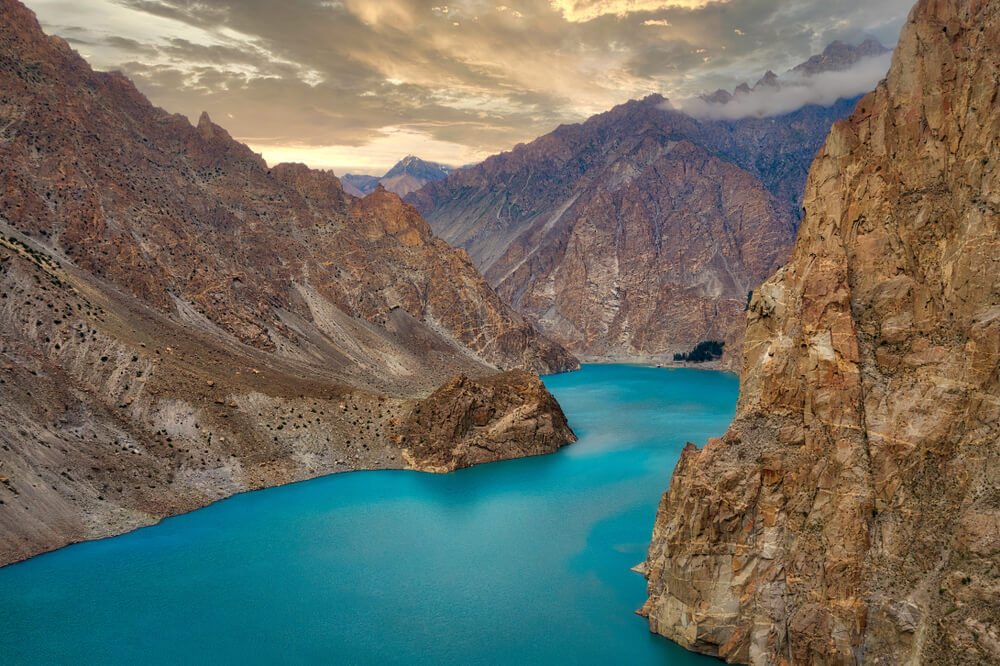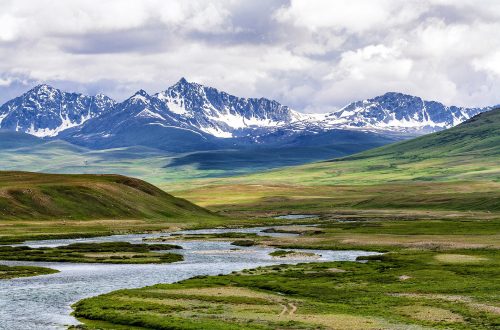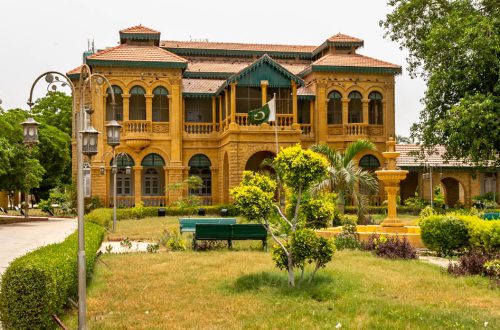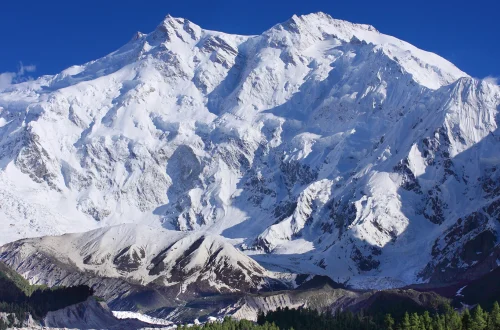Nestled in the heart of Hunza, Pakistan, Attabad Lake is a testament to nature’s ability to create beauty from catastrophe. Born from the adversity of a massive landslide in 2010 that impeded the flow of the Hunza River, this natural reservoir has transformed into an awe-inspiring tourist destination. Today, Attabad Lake invites adventurers and tranquility seekers alike with its mesmerizing blue waters, dramatic landscapes, and a plethora of activities from boating to hiking. Whether you’re looking to immerse yourself in stunning scenery, embark on thrilling outdoor pursuits, or simply relax in a serene setting, Attabad Lake offers an unforgettable experience amidst Pakistan’s majestic mountains.
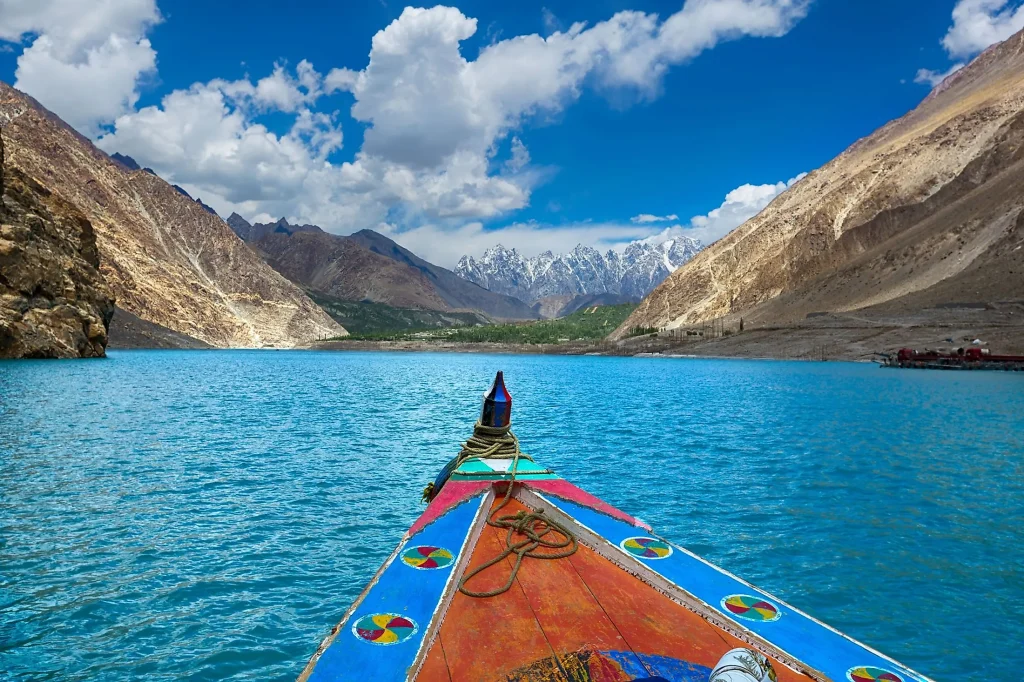
Attabad Lake: A Natural Marvel in Hunza
The Creation of Attabad Lake: A Tragic Beauty
The creation of Attabad Lake in 2010 stands as a poignant reminder of nature’s unpredictable force and its innate capacity to weave beauty from tragedy. In the wake of a devastating landslide that obstructed the Hunza River’s flow in Pakistan’s Gilgit-Baltistan region, despair was palpable as the surging waters inundated villages and displaced countless.
Yet, from this calamity emerged a breathtaking spectacle: Attabad Lake, a turquoise expanse cradled by rugged mountains, transforming the landscape into a mesmerizing blend of sorrow and serenity. This natural reservoir, forged through loss and upheaval, is now a cherished destination, embodying the resilience of nature and communities alike. For knowing other points of Hunza Read.
The History and Formation of Attabad Lake
The history and formation of Attabad Lake in Pakistan’s picturesque Hunza Valley is both tragic and fascinating. In January 2010, a devastating landslide struck the village of Attabad, causing massive boulders and debris to block the flow of the Hunza River. This catastrophic event resulted in the creation of a natural dam, leading to the formation of the lake over the following months. Tragically, the disaster caused loss of lives and displaced many families. Despite its sorrowful origin, Attabad Lake has emerged as a stunning natural wonder, attracting tourists worldwide with its mesmerizing blue waters and the dramatic landscape of the Karakoram mountain range that surrounds it.
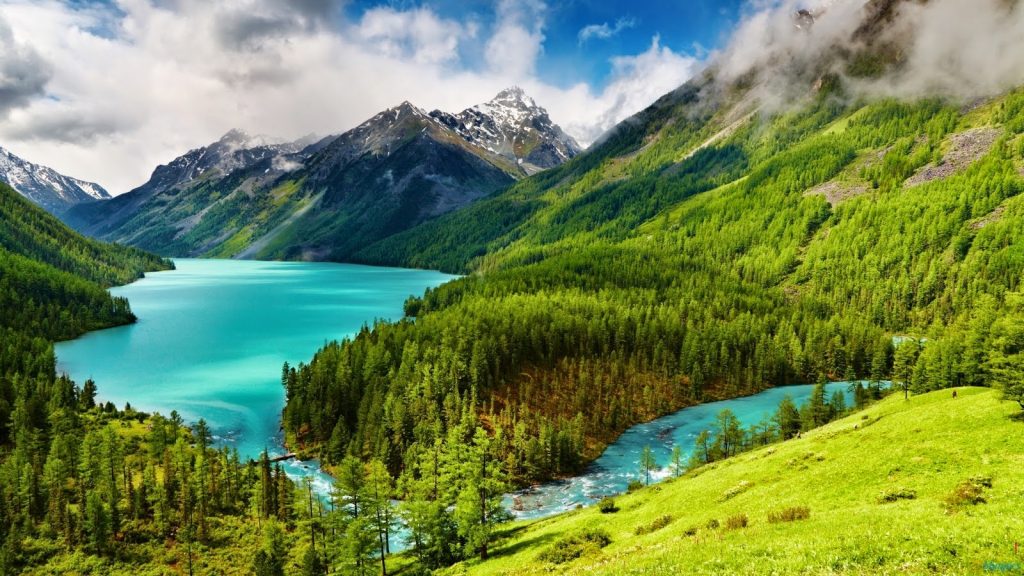
Adventure and Leisure Activities at Attabad Lake
Thrilling Activities at Attabad Lake
Attabad Lake, nestled in Hunza Valley, Pakistan, has quickly become a hub for adventure enthusiasts and those seeking to immerse themselves in nature’s tranquility. Boating across its azure waters offers an unparalleled sense of freedom, while the surrounding landscapes provide a picturesque backdrop.
Fishing enthusiasts find solace in the lake’s abundant supply, promising a rewarding experience. For adrenaline seekers, hiking the rugged terrains around the lake unveils breathtaking vistas and the chance to encounter diverse wildlife. Each activity at Attabad Lake offers a unique way to connect with the natural beauty and vibrant culture of this stunning region, making every visit unforgettable.
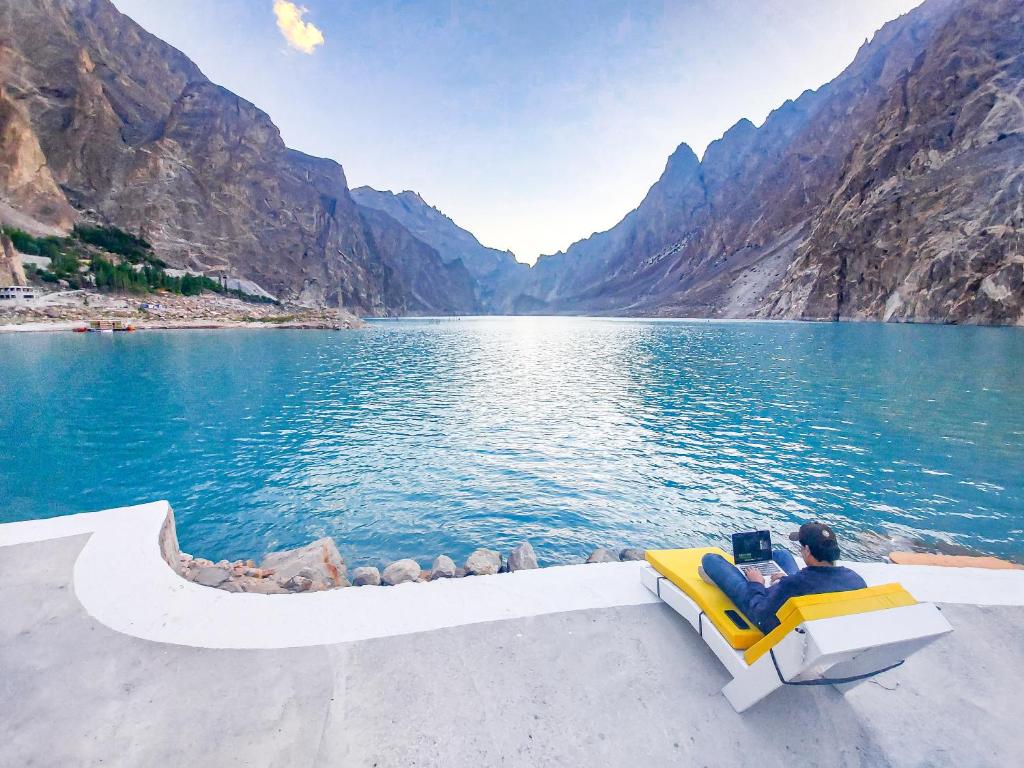
What to Do: Boating, Fishing, and Hiking
Attabad Lake isn’t just a feast for the eyes; it’s a playground for the adventurous spirit. Boating on its turquoise waters not only offers a serene escape but also provides unique vantage points of the surrounding majestic mountains and landscapes, accessible only from the lake itself. For those who find tranquility in the patience of fishing, Attabad’s rich waters promise an enriching experience with the backdrop of Hunza’s unparalleled beauty. Hikers can explore the rugged terrains that envelope the lake, discovering not just breathtaking views but also the silent stories of nature’s resilience and beauty. At Attabad Lake, every activity is an encounter with the sublime.
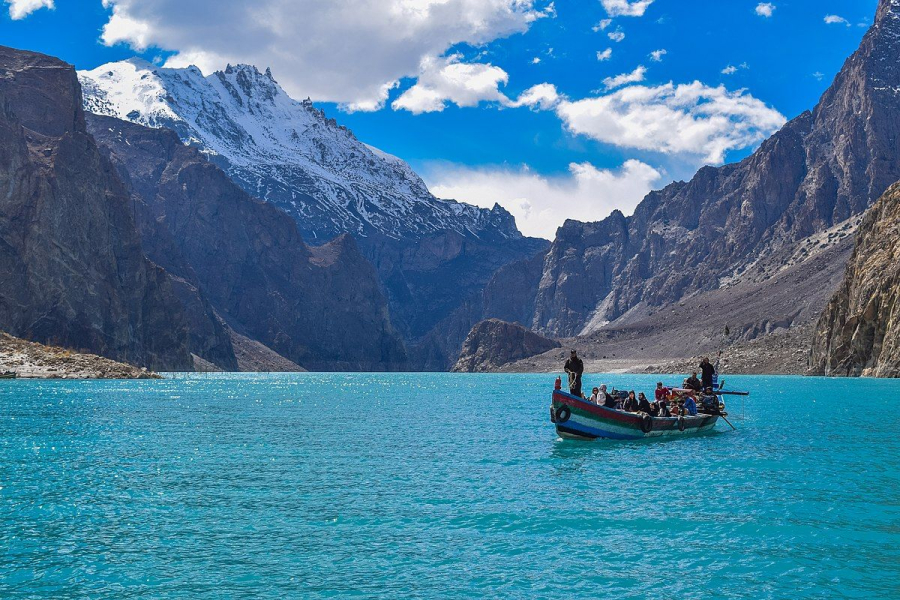
Unveiling the Beauty: The Scenic Landscapes of Attabad Lake
Discover the Stunning Scenery of Attabad Lake
Attabad Lake’s ethereal beauty captivates all who visit. Cradled in the majestic mountains of Hunza, Pakistan, its stunning turquoise waters contrast sharply with the rugged landscape, offering a spectacle that seems otherworldly. The vivid hues of the lake change with the sunlight, creating a dynamic vista that photographers dream of capturing. A boat ride across Attabad reveals hidden nuances of its beauty, from the serene shimmer of sun on water to the dramatic shadows cast by the peaks. Every angle presents a new perspective, making the lake a treasure trove of natural scenic wonders. A journey to Attabad Lake is to witness the marvels of nature’s artistry firsthand.
Photographic Views
Attabad Lake, with its enchanting blue waters and dramatic mountainous backdrop, is a photographer’s paradise. Each view around the lake offers a unique canvas—sunlight dancing on the water’s surface, the play of shadows and light at dawn and dusk, and the vibrant hues that change with the seasons. Photographers, both amateur and professional, are drawn to this location to capture its serene beauty and dynamic landscapes. The contrast of the turquoise waters against the rugged terrain provides perfect compositions for breathtaking photography. Whether seeking panoramic landscapes, intimate wildlife shots, or the human element of local life and culture, Attabad Lake’s photographic views never cease to inspire and amaze.
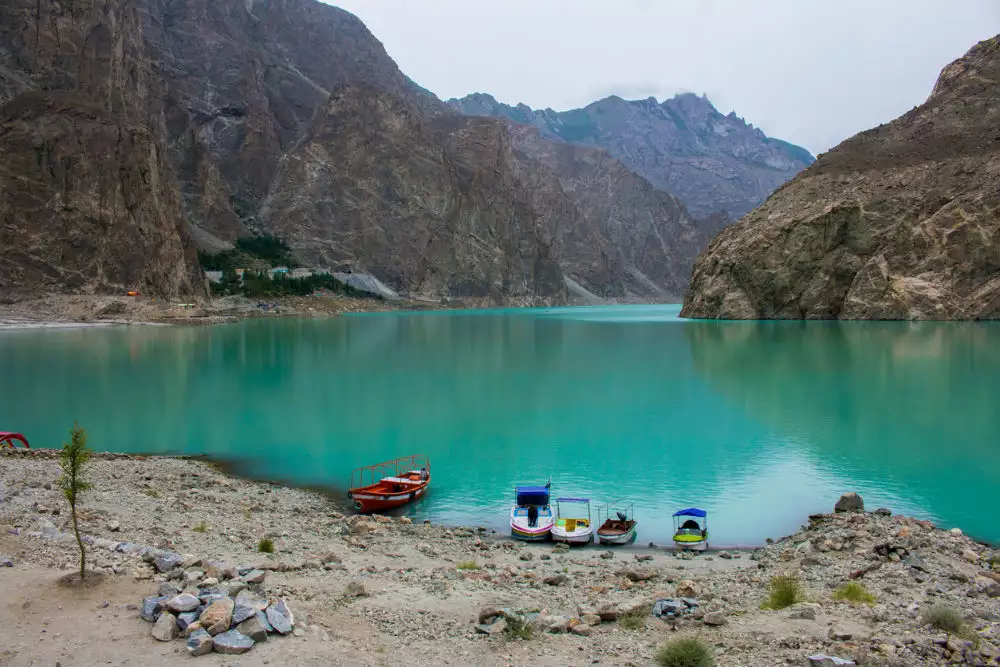
Planning Your Visit to Attabad Lake
Where to Stay: Accommodations Near Attabad Lake
In the shadow of Attabad Lake’s serene beauty, visitors are spoiled for choice with a range of accommodations that promise comfort and breathtaking views. From luxurious hotels that offer all modern amenities with a touch of traditional hospitality, to cozy guest houses that provide a more intimate experience of the Hunza Valley’s charm, there’s something for every traveler. Many of these accommodations are strategically located to offer panoramic views of Attabad Lake and easy access to its recreational activities. Immersed in the tranquil ambiance of the surroundings, guests can find peace and rejuvenation after a day filled with adventure and exploration, making their stay at Attabad Lake unforgettable.
Essential Visitor Information: Tickets and Operating Hours
Planning a visit to Attabad Lake? It’s essential to know that the lake is accessible to the public with entry tickets priced at 200 PKR for adults and 100 PKR for children, ensuring a managed and enjoyable experience for everyone. The lake operates welcoming visitors from 9 am to 5 pm, offering ample time to explore its natural beauty and engage in various recreational activities. To make the most of your visit, arriving early is advised to avoid the peak times and to fully immerse in the tranquility of the surroundings. This majestic destination awaits your discovery, promising an unforgettable experience amidst Hunza’s breathtaking landscapes.
A Visitor’s Guide to Attabad Lake: Tips and Tricks
A visit in the heart of Hunza, promises an unforgettable experience with its stunning blue waters and majestic surroundings. To make the most of your journey, here are some tips and tricks: Firstly, plan your visit during the early hours to enjoy serene lake views with fewer crowds. Packing sunblock, hats, and sunglasses is essential to protect against the sun’s reflection off the water.
Opting for local guides not only enriches your experience with insider knowledge but also supports the community. Remember to carry cash for entry tickets and local purchases, as digital payments may not be widely accepted. Lastly, respect the natural beauty by adhering to eco-friendly practices, ensuring this Lake remains pristine for future generations.

Accommodations Near Attabad Lake: Where to Stay
Near the mesmerizing Attabad Lake, nestled within Hunza’s majestic landscapes, visitors will find a variety of accommodations to suit all preferences and budgets. From luxurious hotels offering panoramic views of the lake and the surrounding mountains to cozy guest houses providing a more personal touch, there is something for everyone.
Many of these establishments blend local architectural styles with modern amenities, ensuring a comfortable and authentic experience. Staying near Lake allows travelers to wake up to breathtaking views and the tranquility of nature’s masterpiece. It’s advisable to book in advance, especially during peak tourist seasons, to secure your spot in this picturesque setting.
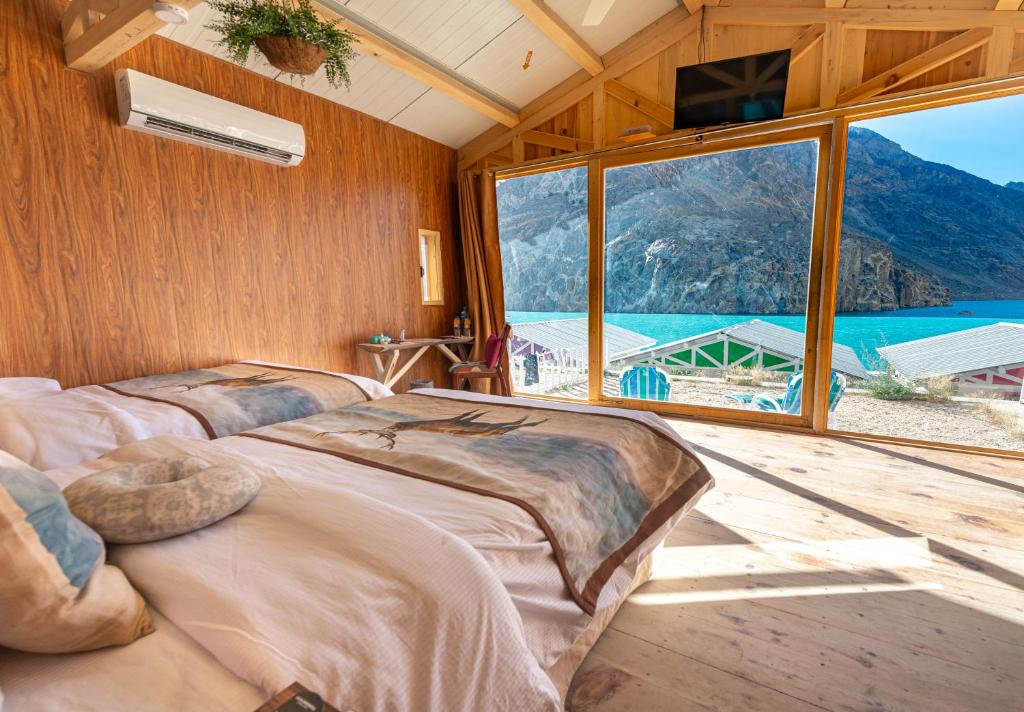
Attabad Hotels
Hotels near Attabad Lake offer guests a unique blend of comfort and natural beauty, making for an unforgettable stay in Hunza. These accommodations range from luxury resorts to charming boutique hotels, all designed to provide visitors with exceptional views of the lake and the surrounding Karakoram mountains.
Many Attabad hotels feature traditional decor, integrating local culture into their ambiance, while also offering modern amenities such as Wi-Fi, on-site dining, and guided tours. Staying at these hotels, guests can relax after a day of exploring the lake’s activities, enjoying the serene atmosphere and hospitality that the region is known for.
What happened at Attabad Lake?
The creation of the lake ensued from a significant landslide striking Attabad village in the Gojal Valley, located 14 kilometers upstream (east) of Karimabad, on January 4, 2010. This calamity claimed the lives of twenty individuals and obstructed the Hunza River’s course for a duration of five months.
Why is Attabad Lake so blue?
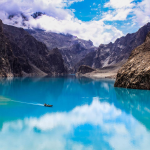
Attabad Lake lies nestled in the scenic Gojal Valley of Hunza, within Gilgit Baltistan, Pakistan. Stretching across a length of 14 kilometers, the lake emerged following a catastrophic event in Attabad village. Its waters, a serene shade of icy blue, are fed by the nearby glaciers and the flow of the Hunza River.
Is Attabad Lake shrinking?
Attabad Lake, an artificial reservoir, has been steadily diminishing over the past two years, according to experts. They attribute the rapid shrinkage to the erosion of the spillway by the flow of the Hunza River. Should this trend persist, the lake’s water is projected to completely discharge within the next few years.
Is Attabad Lake natural?
Nestled in the breathtaking Gojal Valley of Gilgit Baltistan, Pakistan, is the mesmerizing Attabad Lake, formed as a result of a natural disaster in 2010.
